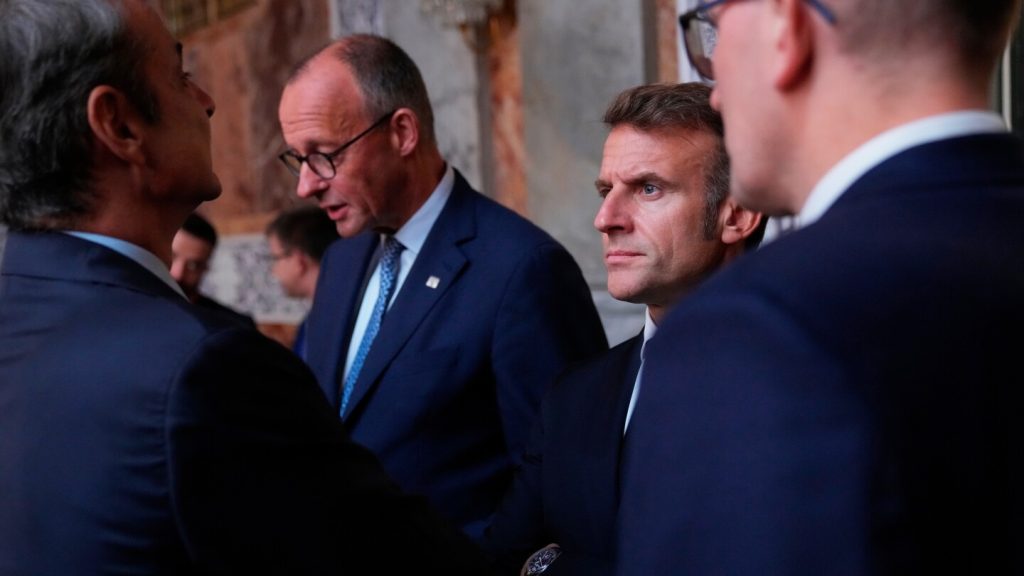COPENHAGEN, Denmark (AP) — European Union leaders on Wednesday weighed a new scheme to provide longer-term financial and military support to Ukraine using hundreds of billions of dollars in frozen Russian assets held in Europe.
The plan — which Moscow has described as “theft” — is a fresh sign of the EU’s determination to push ahead alone with support for Ukraine without the United States. Under President Donald Trump the U.S. no longer sends financial aid to Ukraine, and little so far in the way of weapons.
Ukraine’s budget and military needs for 2026 and 2027 are estimated to total around 130 billion euros ($153 billion). The EU has already poured in 174 billion euros since the war started in February 2022.
The biggest pot of ready funds available is through frozen Russian assets. Most of it is held in Belgium – around 194 billion euros as of June – and outside the EU in Japan, with around $50 billion, and the U.S., U.K. and Canada with lesser amounts.
The European Commission is working on a new “reparation loan” which would be backed by the frozen assets, if the 27 member countries agree, but not all were onboard going into Wednesday’s EU summit in Copenhagen.
Russia has warned against the move. Kremlin spokesman Dmitry Peskov said in a call with reporters Wednesday that the EU’s intentions “amount to plans to illegally confiscate Russian property — in Russian, we call it theft.”
However, commission President Ursula von der Leyen said that “we are not confiscating the assets, but we are taking the cash balances for a loan to Ukraine.” She told reporters that “Ukraine has to pay back this loan if Russia pays reparations.”
“Russia is the perpetrator. It has caused the damage, and it has to be held accountable,” von der Leyen said, and added that she thinks her team has found “a sound legal way to do this” and to get reluctant member countries onside.
‘Some legal questions’
In essence, EU countries would lend Ukraine around 140 billion euros ($165 billion). Kyiv would only refund the money once Russia pays significant war reparations to Ukraine for the massive destruction its war has caused.
Should Moscow refuse, the assets would remain frozen.
Danish Prime Minister Mette Frederiksen, who was hosting the summit in Copenhagen, said that the commission’s plan “is actually quite a good way forward.”
She added: “There are some legal questions that have to be asked and I’m confident that we will find a way through this. But the whole idea of using the frozen assets I think is a good idea.”
EU foreign policy chief Kaja Kallas declined to predict when the plan might be finalized. “It’s not supported by everybody yet, so there’s still a lot of work to do,” she told reporters. “But if we don’t take those assets into account then it’s on our taxpayers, that’s for sure.”
Differences to bridge
The European Central Bank has warned that seizing the assets themselves would damage the credibility of the euro single currency. Belgium is wary of making itself a target for Russia and is reluctant to act without clear support from its EU partners.
The EU’s executive branch believes that European governments will buy into the idea because it does not involve seizing the assets, and because many have diverted budget funds to defense spending and some, like France and Italy, are mired in debt.
Ideally, the loans would be covered under the EU’s next long-term budget. But should that avenue be blocked – Hungary has routinely vetoed EU support for Ukraine – it would have be done through national guarantees, and France in particular is hesitant.
French President Emmanuel Macron did cautiously welcome the plan, but underlined that “we need to remain a place that’s attractive and reliable, we Europeans. That means that when assets are frozen, we respect international law.”
Others were openly supportive. “Investing in Ukraine is an investment in European security as a whole,” Finland and Sweden wrote to their EU counterparts ahead of the summit. “It is key that the loan to Ukraine is only to be repaid once Ukraine receives war reparations from Russia.”
Differences over the scheme
German Chancellor Friedrich Merz said last week that it was time “to apply an effective lever that will disrupt the Russian president’s cynical game of buying time and bring him to the negotiating table.”
“That requires the courage and confidence to set our own agenda, rather than merely react to his,” Merz wrote in an op-ed in The Financial Times newspaper. He said the loan “would secure Ukraine’s defense capabilities for several years.”
But in a sign of some of the differences countries have about the scheme, Merz underlined that the money must be used for military support, not economic aid.
Interest earned on the frozen assets is already being used to fund a loan program for Ukraine organized by the Group of Seven major world powers, and this would not be impacted by the plan.


